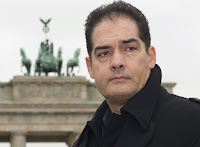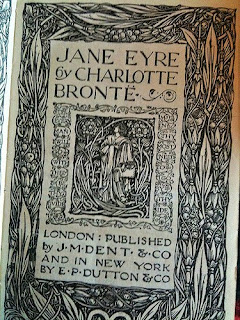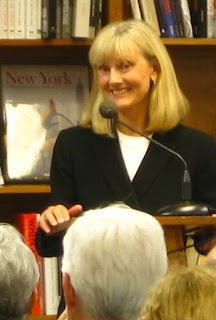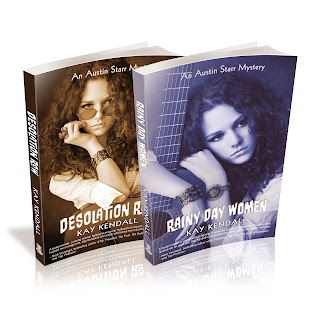The Allure of Mysteries—Dark and Historical Ones
By Kay Kendall
The main reason usually given to explain the enduring appeal of mysteries is that readers like to enter a world of suspense and chaos, knowing that everything will be tidied up and turn satisfactory in the end. This format has held true for the traditional mystery for decades, and even though there are now many variations on that theme, the reasoning remains largely the same. The reader enters into a scary world, experiences thrills and spills, and then comes out the other side with all the puzzles solved and the bad guy or gal apprehended and on the way to sure punishment.
Astute fans of crime fiction will be thinking at this point–“Ah yes, but what about noir?” Other younger fans may say–“But what about dystopian fiction? I like deep, dark scary stuff where everything in the world is bleak and still I can find room for hope.”
 |
| Author Philip Kerr in Berlin |
Well, to each her or his own, I say in rejoinder. On the one hand, noir is too dark for me. I get depressed reading about all those losers hanging onto their lives by mere threads yet still striving to get ahead, find romance, make the killing (either of the flesh or the pocketbook), or escape from one last jam.
I do make exceptions for the best writers of noir fiction. Two such authors whose books always land on my must-read list are Reed Farrel Coleman and Timothy Hallinan. When I open one of their books, I know it will take me into the darkest reaches of the human soul, but the understanding of psychology and the writing itself will be so sublime that I am willing to go that deep and that dark. Louise Penny is a writer of traditional mysteries whose work seems to go ever darker as her books stack up. She also takes us readers into torturous psychological territory, but her protagonist is a fine man–chief inspector Armand Gamache of the Quebec provincial police–he of impeccable morals and astute ability to decipher human hearts. His shining rectitude and compassion shoot bright rays of hope through all her novels.
All three of these writers have won multiple awards for their fine books. Dark and unforgiving as I know their plots will be, I always look forward to the publication of their books. If it is going to be noir, then it has to be of the very best quality, elsewise I will not read it. Otherwise, it simply isn’t worth it for me to get depressed. Why escape from a fractious world into a fictional one that holds few pleasures? That is not escape. It is torture.
In contrast to my approach to mysteries of the noir variety is how I view historical mysteries. I love history so much that I can put up with an average mystery as long as the depiction of a long ago time is interesting and accurate. In the same vein, I often say that I will see any film if I know the actors and actresses wear period costumes. That may sound a bit extreme, but I do mean it. And I can go very dark when reading historical fiction because I know how that time period concluded. I know the good side won in World War Two, for example. and I don’t get overly anxious as I would if I were to pick up, say, a thriller based on nuclear brinkmanship with some country ruled by a madman.
In fact, historical mysteries set against the backdrop of either world war are among my favorites. I’ve blogged before about how author Jacqueline Winspear‘s books starring Maisie Dobbs have inspired my own fiction. After serving as a nurse in World War One, Maisie turns professional sleuth and amateur psychologist, and now as the series creeps up to the beginning of World War Two, she has taken to working with the British foreign office. I also admire the World War One mysteries of the mother-and-son writing duo of Charles Todd.
But perhaps the author whose mysteries speak deepest of all to me is Philip Kerr. He combines excellent writing with impeccable historical research, while focusing on the hapless case of Bernie Gunther, a decent cop in Berlin as Hitler seizes power. The Bernie Gunther books now number twelve, with the next one releasing this April. They show a basically good man trying to swim in a toxic sea of Nazis and not drown in filth. His earliest adventures are set in 1932, and his latest escapades show his entanglements with the Stasi in East Germany in 1956.
Talk about darkness of the soul. Poor Bernie can never escape his checkered past, and in the last two books he has become suicidal. I don’t know how long he can go on, but I hope like crazy that he can. When Philip Kerr announces the publication of a new book, I rejoice. He also comes through my city on book tour, and then I get to pick his brain during a book event about the wealth of research he has done in the Nazi era in Germany. So I guess I do have a taste for noir after all.
~~~~~~~
Kay Kendall is a long-time fan of historical
novels and now writes atmospheric mysteries that capture the spirit and
turbulence of the sixties. A reformed PR executive who won international awards
for her projects, Kay lives in Texas with her Canadian husband, three house
rabbits, and spaniel Wills. Terribly allergic to her bunnies, she loves them
anyway! Her book titles show she’s a Bob Dylan buff too. Rainy Day Women won two Silver Falchion
Awards at Killer Nashville in 2015. Visit Kay at her website
<http://www.austinstarr.com/>or on Facebook < https://www.facebook.com/KayKendallAuthor>.







